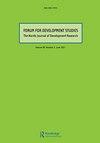1990年以来瑞典的发展政策:等待发生的政策范式转变?
IF 1.1
Q3 DEVELOPMENT STUDIES
引用次数: 0
摘要
摘要自1962年瑞典正式发展政策诞生以来,瑞典援助的首要目标一直是减少贫困。虽然该目标已经四次修订(在两个社会民主政府和两个保守政府的领导下),但它只是重新表述,而不是改革。此外,瑞典每年将国民总收入的1%用于发展援助的雄心自1975年首次实现以来,基本上得到了支持,除了13年(1993-2005年,在社会民主统治下)因预算压力而被放弃。然而,援助从未低于国民总收入的0.7%。即使在政府更迭的情况下,目标和数量也没有随着时间的推移而改变,这表明瑞典的发展合作政策是在协商一致的基础上形成的。然而,这种明显的连续性掩盖了政党政策偏好之间的一些重要差异,而绝大多数人支持现行政策可能比达成共识更能解释这种稳定。我认为,今天,将这些不同的思想立场转化为政策变革的先决条件是非常有利的,这表明政策范式的转变,即“激进的政策变革”,可能正在形成。本文章由计算机程序翻译,如有差异,请以英文原文为准。
Sweden’s Development Policy Since 1990: A Policy Paradigm Shift Waiting to Happen?
Abstract
Since the birth of the formal Swedish development policy in 1962, the overarching goal of Swedish aid has been poverty reduction. While the goal has been up for revision four times (under two social democratic and two conservative governments) it has only been rephrased rather than reformed. In addition, Sweden’s ambition to devote one per cent of its gross national income to development aid each year has been largely upheld since it was first achieved in 1975, save a period of 13 years (1993–2005, under the social democratic rule) where it was abandoned with reference to budgetary pressures. Aid was, however, never less than 0.7 per cent of GNI. Goals and volumes not being altered over time, even under government changes, suggest Swedish development cooperation policy has been formed under consensus. This apparent continuity, however, masks some important differences between political parties’ policy preferences, and the stability may be better explained by large majorities being in favour of current policies than by consensus. I argue that the preconditions for those differing ideational positions to be translated into policy change are today quite favourable, suggesting that a policy paradigm shift, a ‘radical policy change’, may be in the making.
求助全文
通过发布文献求助,成功后即可免费获取论文全文。
去求助
来源期刊

FORUM FOR DEVELOPMENT STUDIES
DEVELOPMENT STUDIES-
CiteScore
1.80
自引率
14.30%
发文量
24
期刊介绍:
Forum for Development Studies was established in 1974, and soon became the leading Norwegian journal for development research. While this position has been consolidated, Forum has gradually become an international journal, with its main constituency in the Nordic countries. The journal is owned by the Norwegian Institute of International Affairs (NUPI) and the Norwegian Association for Development Research. Forum aims to be a platform for development research broadly defined – including the social sciences, economics, history and law. All articles are double-blind peer-reviewed. In order to maintain the journal as a meeting place for different disciplines, we encourage authors to communicate across disciplinary boundaries. Contributions that limit the use of exclusive terminology and frame the questions explored in ways that are accessible to the whole range of the Journal''s readership will be given priority.
 求助内容:
求助内容: 应助结果提醒方式:
应助结果提醒方式:


